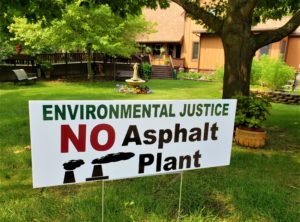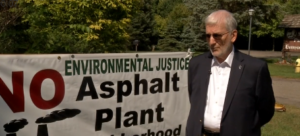By Harold C. Ford
Public opposition and appeals to state and Federal regulatory agencies have thus far failed to derail plans for an asphalt plant in Genesee Township very near northeast Flint. An air permit was approved by the Michigan Department of Environment, Great Lakes and Energy (EGLE) in November allowing Ajax Materials Corporation to move forward.

Protest sign on the grounds of St. Francis Prayer Center on Carpenter Rd. (Photo by Tom Travis)
The construction site is within an industrial park on Energy Drive adjacent to the St. Francis Prayer Center, 2381 Carpenter Rd, and only one-tenth mile from northeast Flint neighborhoods. They are “some of the lowest-income and predominantly black neighborhoods in Flint,” according to Mona Monroe-Younis, executive director of Environmental Transformation Movement of Flint (ETM).
Opposition to the plant is organizing around the issue of pollution in the context of environmental racism. Genesee Township is 80 percent white; few of its residents live in close proximity to the proposed plant.
About 86 percent of the people within one mile of the proposed facility are people of color, according to industrial hygienist and Flint resident Peterson Cullimore.

Peterson Cullimore, industrial hygienist; Windborne Group, partner. (Photo source: LinkedIn)
Flint’s population is 56 percent black; its poverty rate is 39 percent, more than twice that of Genesee Township.
Some available data support the protestors’ arguments. A Jan. 2, 2022 report by the Detroit Free Press “found a connection between where air pollution permits are approved and communities where long-standing racial and socioeconomic disparities persist. Poor and minority populations make up a larger share of the population in areas where an air pollution permit was recently approved than in areas without permit activity.”
Opposition
A broad coalition of groups and individuals have organized in opposition to the proposed plant, including Earthjustice, Great Lakes Environmental Law Center, the National Housing Law Project, ETM, Flint Rising, and the St. Francis Prayer Center.
In a Dec. 18 statement, coalition members charged, “If built, the asphalt plant would release hundreds of tons of air pollution every year in a community that already has one of the highest rates of residents being hospitalized because of asthma in Michigan.”
According to the Free Press, “Genesee County’s asthma hospitalization rate is nearly double the statewide average, according to the Michigan Department of Health and Human Services.”
“There’s a whole host of industrial facilities along Dort Highway within half a mile,” said Mona Monroe-Younis, ETM’s executive director, at a Nov. 15 community forum. “All of these facilities together are creating a high level of asthma.”

Environmental justice advocate, Mona Younis, speaks to the Flint City Council in 2021 suggesting actions they can take against a proposed asphalt company just north of the Flint border. (Photo by Tom Travis)
Flint Mayor Sheldon Neeley issued a statement Nov. 15 following the permit approval by EGLE. It read, in part:
“The decision to approve the Ajax Materials Corporation’s permit is very disappointing … This continues to happen in poor to moderate communities with black and brown residents … without consideration of our families’ health and safety first.”
“Adding one more plant is very concerning to us,” added Monroe-Younis. “We’re all saying with one united voice, ‘This plant should not be here. Putting it here is an act of environmental racism.’ ”
“We’re worried about the combined risk of these hazardous air pollutants and air toxics, namely the ones that are suspected or confirmed human carcinogens which have been confirmed in asphalt fumes,” Cullimore said.
“We’re also interested in odor,” added Cullimore, “not being able to open our windows … Odor itself can be grounds for denying a permit like this.” Dust, noise pollution, light pollution, and the negative impact on real estate prices – thus widening the racial wealth gap – are other concerns.
“Here we go again,” said Quincy Murphy, city councilperson for Flint’s 3rd Ward, in referencing the city’s infamous water crisis, 2014 to the present.

Local activist and Flint City Councilperson Quincy Murphy (Ward 3). (Photo source: City of Flint website)
At a “listening session” in Flint’s Riverpark neighborhood on Dec. 18, 2021, Murphy heard from local residents, or their representatives, who would be most directly affected by the proposed Ajax plant:
- Ted Zahrfeldt, director, St. Francis Prayer Center: “This is a fight. This is like Goliath … coming in; we’re like David, but we don’t even have a good slingshot … Genesee Township seems to have no care or concern for the community, the community where this plant is going.”

Ted Zahrfeldt speaking with local media at the St. Francis Prayer Center. (Photo source: WNEM interview)
- LaShaya Darisaw, political and organizational consultant: “This is a civil rights issue … based on its pattern of discriminating against black and brown communities.”

LaShaya Darisaw, political and organizational consultant. (Photo source: LinkedIn)
- Unidentified resident: “This asphalt plant is greatly going to destroy the Flint River because of their (Ajax) water runoff.”
“This is an ideal situation for the state to stand up for environmental justice and demand a cumulative risk assessment prior to any permitting,” Cullimore said. “We will not trade our health for … freshly paved roads.”
EPA research confirms health consequences
“Asphalt plants mix gravel and sand with crude oil derivatives to make the asphalt used to pave roads, highways, and parking lots across the U.S. These plants release millions of pounds of chemicals into the air during production each year, including many cancer-causing toxic air pollutants such as arsenic, benzene, formaldehyde, cadmium … hexane, phenol, polycyclic organic matter, and toluene …”
“Other toxic chemicals are released into the air as the asphalt is loaded into trucks and hauled from the plant site, including volatile organic compounds, polycyclic aromatic hydrocarbons (PAHs), and very fine condensed particulates.
“Exposure to these air toxics may cause cancer, central nervous system problems, liver damage, respiratory problems … coughing, wheezing or shortness of breath, severe irritation of skin, headaches, dizziness, and nausea. Animal studies show PAHs affect reproduction, cause birth defects and are harmful to the immune system.”
Appeals to state and federal agencies
In addition to several public information/protest meetings, anti-asphalt plant activists have formally raised their concerns about the asphalt plant in the following ways:
- Sept. 21, 2021: Official comments filed with EGLE regarding air quality;
- Oct. 27, 2021: Request for EPA’s External Civil Rights Compliance Office to review possible Title VI violation of the Civil Rights Act;
- Nov. 8, 2021: Administrative complaint filed with the EPA contending EGLE did not sufficiently study risks/impacts on Flint community;
- Dec. 15, 2021: Administrative complaint filed with Department of Housing and Urban Development (HUD) alleging various civil rights violations.
None of the above actions have been successful so far in halting construction of the plant.
Ajax received its air permit approval on Nov. 15, 2021. The next day Michigan Gov. Gretchen Whitmer sent an email contending EGLE “took every measure it could … to protect residents in the plant’s vicinity.” Those permit protections included:
- Cannot burn waste oil;
- Limitations on sulfur content in fuels burned;
- More stringent smokestack tests for pollutants;
- Development of a fugitive dust plan.
EVM seeking response from Ajax, state and federal governments
EVM is seeking responses to the proposed asphalt plant in Genesee Township from Ajax itself, and from officials and agencies at the state and federal levels. Those include: U.S. Senators Debbie Stabenow and Gary Peters; U.S. Congressman Dan Kildee (5th District); the EPA; HUD; Michigan Gov. Gretchen Whitmer; State Senator Jim Ananich (27th District); Michigan Representative David Martin (48th District); EGLE, Michigan Department of Environment; Genesee County Commissioner Gary Peppin (9th District); and Genesee Township Supervisor Daniel Eashoo.
EVM will report on their responses in its print and online editions.
48217
Theresa Landrum, a lifelong resident of southeast Detroit, said at the Nov. 15 forum she was introduced to the possibility of environmental injustice when the local Sierra Club’s Rhonda Anderson asked, “Did you ever think that the illnesses in your community were being caused … where you live at and what is surrounding you as far as industry?”

Theresa Landrum, Evergreen Advisory Board member. (Photo source: Evergreen Action)
Her neighborhood, known by its 48217-zip code, was found to be one of the most polluted communities in the nation. Landrum survived a bout with cancer; her parents did not. Nor did a disproportionately high number of neighbors in the predominantly African American community.
More that 40 pollution-spewing enterprises were/are located inside 48217, Landrum said. An asphalt company, Marathon Petroleum Company Asphalt Terminal, was but one of those enterprises.
Landrum and her environmental justice compatriots have lobbied four Michigan governors and three directors of the Michigan Department of Environmental Equality (MDEQ) to address the “cumulative impact” on the residents of her community by some four dozen polluters.
Landrum told Nov. 15 forum participants that, “Hundreds, and maybe thousands, of chemicals (were) being allowed to emit into the air … we began to understand that these different kinds of cancers, these different kinds of breathing health issues could possibly be connected to our environment.”
The local Beaumont health facility reported a disproportionately high number of childhood asthma cases in 48217. “That was unprecedented,” said Landrum. When stonewalled by MDEQ for the given reason of “no data”, Landrum and other activists created a “health survey” that was distributed by local churches.
“They found that 48217 was the most polluted zip code … in the state of Michigan,” recalled Landrum. “We had some of the highest cancer rates across the nation.” EGLE refuted the information. It took two more years for the Center for Disease Control to confirm the results of the health survey generated by Landrum and her colleagues.
Landrum said Standard & Poor’s, an American credit rating agency, reported an across-the-nation rise of 20 percent in property values while, at the same time, it reported a 56 percent drop in 48217 property values.
“That shows you,” Landrum asserted, “the data is there, but the regulatory agencies and the local governments and even our state legislatures do not act on behalf of our residents.”
“I feel that the inaction of the regulatory agency of EGLE is not the inability to do it, it’s the unwillingness to do it,” charged Landrum. “They know that these industries are impacting the health of the residents.”
“Over the years, we have not had a very favorable relationship with EGLE because the culture, the mentality is siloed,” alleged Landrum. “One department does not talk to the other department … That is not for the benefit of the residents.”
“Who has done a long-term study of the health of the residents to show that the standards set by the EPA (Environmental Protection Agency) … is adequate for human life to exist?” asked Landrum rhetorically. “‘Nobody.’ So, we have to do our own work and our own studies.”
Landrum declared that state and federal governments have statutory provisions to investigate the “cumulative impact” of pollution(s). “But they don’t,” said Landrum. “Why? Because big money has the money and the ability to lobby against that and it’s not favorable to their company.”
Landrum and her environmental justice colleagues are asking for a “health impact assessment” and “cumulative impact assessment” for every permit that is considered.
“Michigan has industrialized the lives of people,” said Landrum. “Industry is more important than people’s lives. We’re casualties of industrial greed.”
EVM staff writer Harold C. Ford can be reached at hcford1185@gmail.com.



You must be logged in to post a comment.